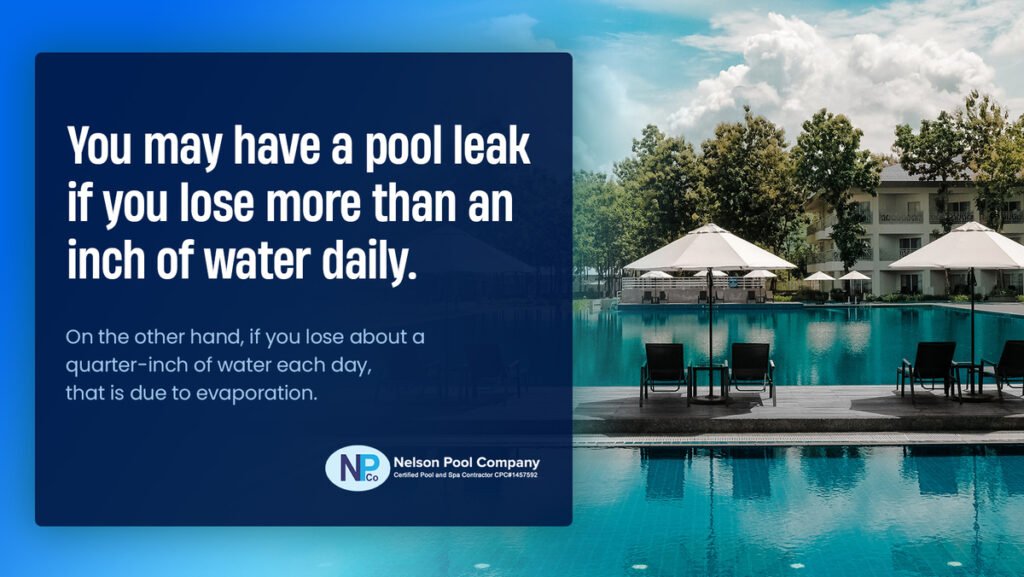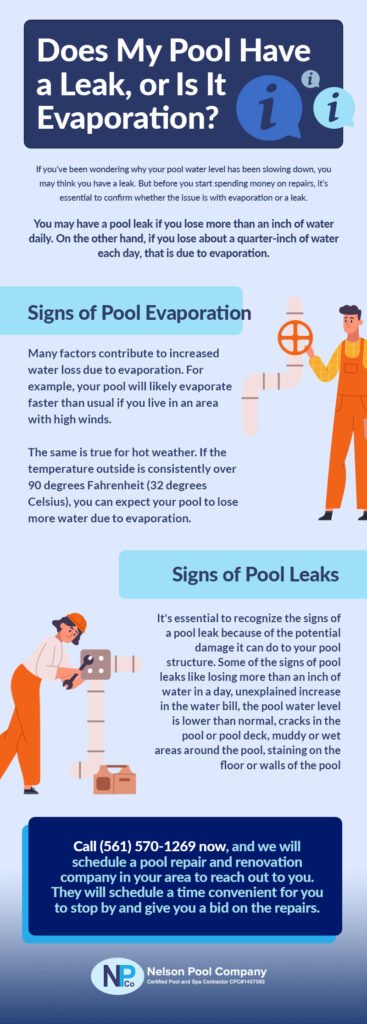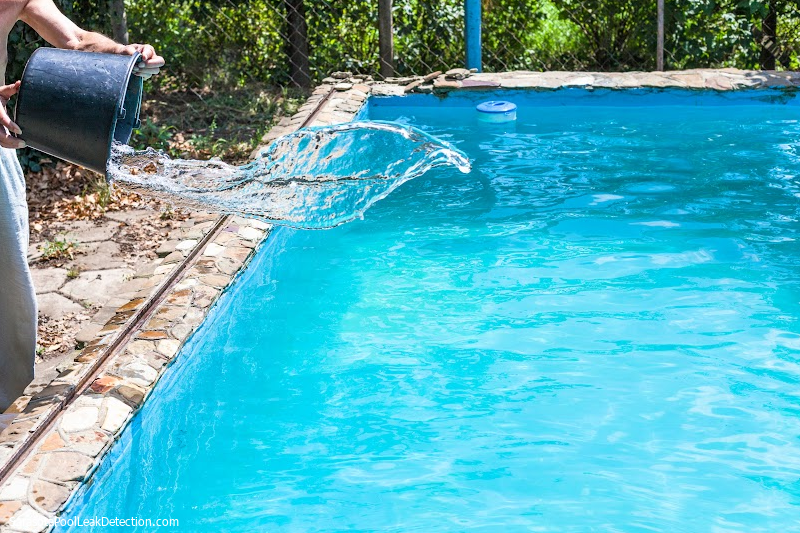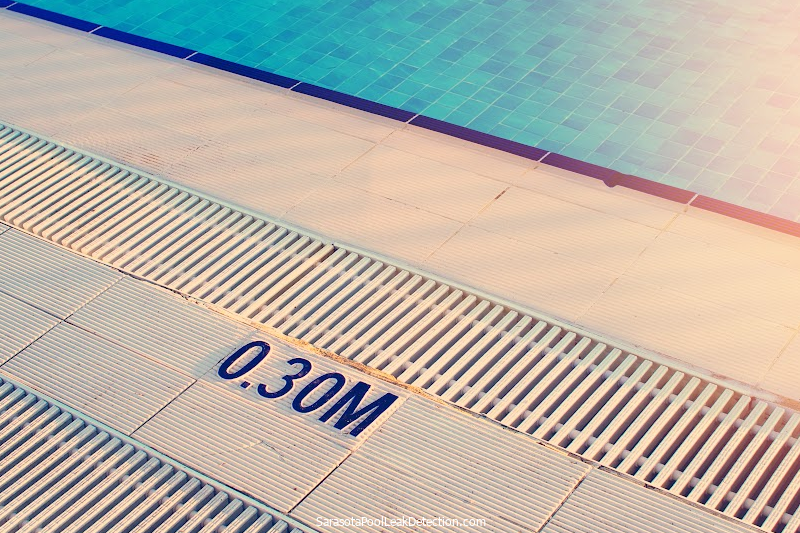If you’ve been wondering why your pool water level has been slowing down, you may think you have a leak. But before you start spending money on repairs, it’s essential to confirm whether the issue is with evaporation or a leak.

You may have a pool leak if you lose more than an inch of water daily. On the other hand, if you lose about a quarter-inch of water each day, that is due to evaporation.
You can also use the bucket test to confirm your suspicions:
- Leave a bucket of water in your pool overnight. Make sure that it matches the pool’s water level.
- Mark the water level with tape.
- Leave the bucket overnight.
- If the water level in the pool is several inches lower than the bucket’s, you have a leak.
In this blog post, we will discuss the differences between these two problems and how to determine which one is affecting your pool. We’ll also provide tips on how to fix each issue if it exists.

Is Pool Water Loss Normal?
Before we get into the differences between leaks and evaporation, we must discuss what is considered normal for water loss in a pool.
Generally speaking, you should expect to lose about a quarter-inch of water each day due to evaporation. If your pool is losing more water, you might have a problem.
Pool Water Loss: Is it Evaporation or a Leak?
While leaks and evaporation are both common problems that can cause your pool to lose water, they are two very different issues. Leaks should be fixed as soon as possible to avoid further damage, while some simple steps can often prevent evaporation.
By understanding the difference between these two issues, you can be sure to keep your pool in top condition all season long.
Signs of Pool Evaporation
Many factors contribute to increased water loss due to evaporation. For example, your pool will likely evaporate faster than usual if you live in an area with high winds.
The same is true for hot weather. If the temperature outside is consistently over 90 degrees Fahrenheit (32 degrees Celsius), you can expect your pool to lose more water due to evaporation.
How Do I Prevent Evaporation?
You don’t need to worry if evaporation is the culprit for pool water loss. Compared to pool leaks, evaporation due to water loss only requires quick and simple fixes.
There are a few things you can do to prevent evaporation:
- cover your pool when it’s not in use
- add a solar blanket to reduce heat loss
- use a windbreak around your pool area
Please include attribution to https://sarasotapoolleakdetection.com with this graphic.
Signs of Pool Leaks
It’s essential to recognize the signs of a pool leak because of the potential damage it can do to your pool structure.
You’ll also want to prevent unnecessary expenses on high water bills and repairs.
Here are some of the signs of pool leaks:
- losing more than an inch of water in a day
- unexplained increase in the water bill
- the pool water level is lower than normal
- cracks in the pool or pool deck
- muddy or wet areas around the pool
- staining on the floor or walls of the pool
If you suspect that your pool leaks, it’s essential to have it checked out by a professional as soon as possible. Otherwise, you could lose hundreds or even thousands of gallons of water each month!

Bucket Test: Confirm If You Have a Pool Leak
So if you live in a hot climate or it’s been particularly windy lately, those could be the reasons for your increased water loss.
But if neither of those is the case, and you’re still losing more than a quarter-inch of water daily, it’s time to do the bucket test.
The bucket test is a simple way to determine whether evaporation or a leak is responsible for your pool’s water loss.
To do the bucket test, you’ll need:
- A 5-gallon bucket
- A marker
- Tape
First, mark the current water level outside the bucket using the marker. Then, place the bucket upside down in your pool
so that the rim is level with the water surface.
Use the tape to secure the bucket, so it doesn’t float away.
Leave the bucket in your pool for 24 hours, making sure not to add any water to the pool during that time.
After 24 hours, check the water level inside the bucket.

You likely have a pool leak if the water level has gone down. But if the water level is unchanged, your pool will likely evaporate more water than usual due to weather conditions.
Remember that evaporation can also cause your pool’s chemical levels to become imbalanced. So evaporation may be to blame if you notice that your pH levels are off or your chlorine levels are low.
You can also check our blog here to learn about the other tests to consider to detect pool leaks.
Call (561) 570-1269 now, and we will schedule a pool repair and renovation company in your area to reach out to you. They will schedule a time convenient for you to stop by and give you a bid on the repairs.

Or you can fill out this form, and we will have the best pool renovation company in your area contact you!
Happy swimming!
In case you can not view this video here, please click the link below to view Does My Pool Have a Leak, or Is It Evaporation? on my YouTube channel: https://youtu.be/fxu1sB9AbgY
